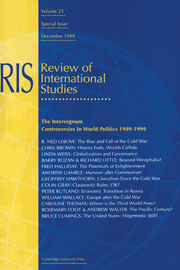Book contents
- Frontmatter
- Contents
- Acknowledgements
- Foreword
- Notes on contributors
- Introduction
- 1 The Rise and Fall of the Cold War in Comparative Perspective
- 2 History Ends, World Collide
- 3 Globalization and National Governance: Antinomies or Interdependence?
- 4 Beyond Westphalia?: Capitalism after the ‘Fall’
- 5 The Potentials of Enlightenment
- 6 Marxism after Communism
- 7 Liberalism Since the Cold War: An Enemy to Itself?
- 8 Clausewitz Rules, OK? The Future is the Past—with GPS
- 9 Mission Impossible? The IMF and the Failure of the Market Transition in Russia
- 10 Europe after the Cold War: Interstate Order or post-Sovereign Regional System?
- 11 Where is the Third World Now?
- 12 Whatever Happened to the Pacific Century?
- 13 Still the American Century
- Index
9 - Mission Impossible? The IMF and the Failure of the Market Transition in Russia
Published online by Cambridge University Press: 05 November 2009
- Frontmatter
- Contents
- Acknowledgements
- Foreword
- Notes on contributors
- Introduction
- 1 The Rise and Fall of the Cold War in Comparative Perspective
- 2 History Ends, World Collide
- 3 Globalization and National Governance: Antinomies or Interdependence?
- 4 Beyond Westphalia?: Capitalism after the ‘Fall’
- 5 The Potentials of Enlightenment
- 6 Marxism after Communism
- 7 Liberalism Since the Cold War: An Enemy to Itself?
- 8 Clausewitz Rules, OK? The Future is the Past—with GPS
- 9 Mission Impossible? The IMF and the Failure of the Market Transition in Russia
- 10 Europe after the Cold War: Interstate Order or post-Sovereign Regional System?
- 11 Where is the Third World Now?
- 12 Whatever Happened to the Pacific Century?
- 13 Still the American Century
- Index
Summary
Introduction
Until the second half of the 1990s, Western commentary about the former Soviet Union and the new Russia basically divided into two camps. On the one side stood those who not only welcomed the end of the USSR but looked forward to the ‘brave new world’ they hoped would be built on the debris left behind by the old order. Having failed to anticipate the demise of Soviet communism, the optimists now predicted a bright new capitalist future for Russia. With excellent access to those in power, they were clearly the most favoured group with Western governments in general and the American government in particular. Certainly, within the US foreign policy elite it was broadly assumed that successful reform in Russia and Russia's integration into the larger capitalist system, was both feasible and necessary. As Strobe Talbott, the architect of American strategy towards Russia, observed in the early days of the Clinton administration, reform in Russia was not just about Russia but the shape of the new international order waiting to be born in the wake of the Cold War. Others were always more sceptical. Post-communist Russia, according to the pessimists, was likely to prove less susceptible to reform than the optimists claimed. The legacy of Russian history, the success of Soviet political culture in shaping the outlook of ordinary Russians, and the failure of the upheavals of 1991 to upset the basic structure of Soviet society, together meant that Russia would prove a particularly tough nut for the reformists to crack.
- Type
- Chapter
- Information
- The Interregnum: Controversies in World Politics 1989–1999 , pp. 183 - 200Publisher: Cambridge University PressPrint publication year: 2000

